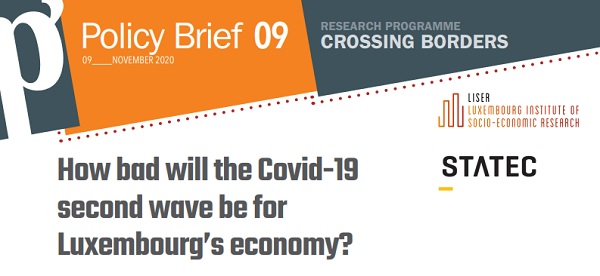
The Luxembourg Institute of Socio-economic Research (LISER) has just issued a policy brief on "How bad will the COVID-19 second wave be for Luxembourg's Economy".
The COVID-19 second wave is hitting much of Europe. While this wave mostly affected young healthy people at its start, it is now spreading to older and more vulnerable segments of the population. It is thus with a weary sense of déjà vu that European citizens have been impacted by new packages of restrictions implemented to contain the virus and to prevent healthcare systems from being overwhelmed. Some countries entered a new (total or partial) lockdown allowing people to leave their home only to go to work (when teleworking is not feasible) or to buy essential goods and seek medical help, banning or limiting social gatherings, prescribing curfew, shutting non-essential activities, etc.
In theory, such restrictions induce ambiguous effects on the economy as they directly curtail market transactions but also avoid panic-driven responses. Yet, lockdown measures implemented in March and April generated mechanical and sizeable cuts in output and plunged most economies into a temporary recession.
History might be repeating itself in the coming weeks and the spectre of a re-confinement hangs over Luxembourg’s economy. In this policy brief, LISER combines recent tools developed at STATEC and LISER to assess the macroeconomic impact of the second wave, to shed light on the interactions between macroeconomic and epidemiological outcomes, and to compare the implications of moderately and highly coercive sanitary measures.
The 14-page policy brief is available at https://liser.elsevierpure.com/ws/portalfiles/portal/26314569/policy_brief_09.05.pdf








